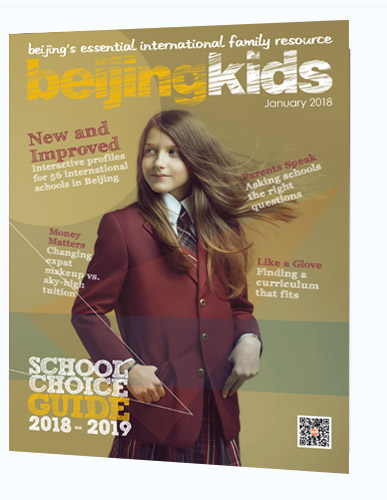Keana Cabrera Kormylo was born and raised in Hong Kong and has a Canadian and Philippine passport. Vivian Kormylo is from the Philippines and Roderick Kormylo is from Canada. This is the family’s third year in Beijing and has been enrolled in Canadian International School of Beijing (CISB) the entire time. The family chose it for many reasons, most importantly because it is a “positive” and “inclusive” school. Next, the teaching staff and administration are friendly and professional, and many have been at the school for more than five years. The curriculum played an important role when they choose CISB as the Kormylos are unsure of where they might go next. The International Baccalaureate (IB) program offers the flexibility of going almost anywhere. Also, as Keana is a third/fourth culture child, the curriculum and staff have a great understanding of her needs and can support her accordingly as a “global citizen.” The curriculum is designed to challenge students of every level, but more importantly, it’s the teachers that deliver it and the professional development they receive to maintain current teaching practices. The drama, swimming, and volleyball programs have made Keana more confident, responsible, and motivated to do her best.
Favorite spot in the school
I love the dance studio. My friends and I do our own choreography and the school provides us with many opportunities to perform.
Favorite teacher in the school
All the teachers in the drama department because they are so supportive, understanding, and motivating
Favorite class
P.E., which includes the swim and volleyball programs. It offers a nice break from the academic rigors and it provides me with many leadership opportunities.
Favorite afterschool activity
Drama is by far, because of the passionate teachers involved. They are the best role models I could imagine!
Favorite thing about the school
Friends! It’s such a friendly environment. I can really relax and just be myself.
Curriculum Spotlight: International Baccalaureate
Founded in 1968, the International Baccalaureate (IB) is a non-profit educational foundation based in Switzerland that is administered by a board of governors and six permanent committees handling policy and best governance practices. IB World Schools are institutions accredited and authorized to offer either or all of the three programs: the Primary Years Programme or PYP (ages 3-12), the Middle Years Programme or MYP (ages 11-16), and the Diploma Programme or IBDP (ages 16-19). CISB gives us more insight into this highly popular curriculum.
What’s unique about this program?
The IB has a 43-year history of high-quality international education. IB World Schools go through a rigorous authorization and evaluation process, and IB teachers participate in a variety of professional development events. The IB has a distinct focus on international education, making it one of the most popular – and natural – choices for expat families in Beijing. The three programs have their own developed and evolving curriculum. The programs have the following core characteristics:
• They require study across a broad range of subjects.
• They emphasize language learning.
• They encourage interdisciplinary learning.
• They include a community service requirement.
How is it applied?
The IBDP is probably the best known. Over two years, students must take six courses drawn from the following subject groups: arts, experimental sciences, language acquisition, studies in language and literature, individuals and society, and mathematics and computer science. Normally, half of these subjects are higher-level courses (240 teaching hours), and the other half are standard-level courses (150 teaching hours). Other hallmarks of the IBDP include the Theory of Knowledge (TOK), “Creativity, Service, and Action” (CAS), and the extended essay. International Baccalaureate (IB) TOK is a compulsory course that focuses on critical thinking and the nature of knowledge. CAS reflects the belief that students should pursue activities outside the classroom. The extended essay is a 4,000-word paper designed to prepare students for undergraduate university work. IBDP students are graded on a scale from 1 to 7, with 7 being the highest. They can also gain up to three extra points for their combined results on TOK and the extended essay, bringing the maximum total grade to 45 points. The IB diploma is awarded to students who obtain at least 24 points and satisfy their requirements in CAS. In general, about 80 percent of students obtain the diploma after being examined; fewer than 1 percent achieve a perfect score.
How well does this education system prepare students for the real world?
The IB diploma is accepted by over 2,000 universities in 75 countries. In addition, IB provides students with an international skill set, including knowledge of a second language, advanced critical thinking skills, dedication to community service, and the ability to appreciate different cultures.
Where is it offered?
It can be found in 140 countries according to the official website statistics. Most IB World Schools are required to have the IB logo on their website and communication materials, therefore the absence of the logo would mean a school isn’t an IB accredited school.
Photo: Uni You
This article originally appeared on p18-19
of beijingkids School Choice Guide 2018-2019.





